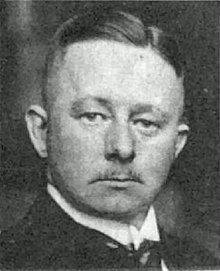Walter Stubbendorff
Walter Stubbendorff (born April 29, 1888 in Zapel ; † May 2, 1945 there ) was a German manor owner and politician (DNVP).
Live and act
Walter Stubbendorff attended the Johanneum secondary school in Lüneburg . After graduating from high school, which he passed in 1908, he completed an agricultural apprenticeship. This was followed by several years of activity as an agricultural officer and military service with the Hunters Regiment on Horses No. 3 in Colmar in Alsace. In the First World War he took part as a reserve officer from the second day of mobilization as a cavalryman . In August 1914 he was awarded the Iron Cross 2nd Class. In the spring of 1915 he was briefly used as an orderly officer in an artillery unit in the west. After that he was the leader of a machine gun company until the end of the war. For the last-mentioned activity he was awarded the Iron Cross 1st Class.
After the war, Stubbendorff took over the management of the Zapel manor in the Brandenburg district of Westprignitz . As the owner of the manor, he was a member of the board of directors of the Brandenburg State Federation from 1919 to 1933. In addition, he held office since the spring of 1920 as chairman of the department of the Landbund in the Westprignitz district. From March 1924 to 1928 Stubbendorff was a representative of the Brandenburg Landbund on the federal executive board of the Reichslandbund and from 1913 to 1926 a member of the German employers' associations. In addition, Stubbendorff was a member of the district committee of the Westprignitz district after the revolution and since 1928 district deputy.
From 1924 to 1932, Walter Stubbendorff was a member of the German National People's Party (DNVP) for constituency 4 (Potsdam) in the Reichstag . Some historians such as Hans Mommsen also attribute him to the leadership of the DNVP.
Web links
- Walter Stubbendorff in the database of members of the Reichstag
- Walter Stubbendorff in the online version of the Reich Chancellery Edition Files. Weimar Republic
Individual evidence
- ↑ Jens Flemming: The Republic of Weimar . 1979, p. 415 .; Max Schwarz : MdR. Biographical handbook of the German Reichstag. 1965, p. 772
- ↑ Johannes Erger : The Kapp-Lüttwitz Putsch. A contribution to German domestic policy 1919/20 . 1967, p. 97.
- ↑ Hans Mommsen , Georg Kreis and Gerd Krumeich: Toepfer, founder and businessman. Building blocks of a biography . 2000, p. 190.
| personal data | |
|---|---|
| SURNAME | Stubbendorff, Walter |
| BRIEF DESCRIPTION | German manor owner and politician (DNVP), MdR |
| DATE OF BIRTH | April 29, 1888 |
| PLACE OF BIRTH | Zapel |
| DATE OF DEATH | May 2, 1945 |
| Place of death | Zapel |
